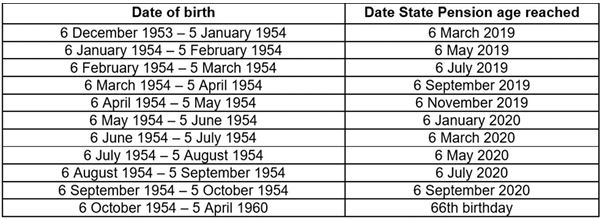Tomorrow marks first day since before the Second World War that men and women in the UK receive the state pension at an age beyond 65.
Anyone with a birthday between 6th December 1953 and 5th January 1954 saw their state pension age shift by up to 3 months, with their retirement date set at 6th March 2019.
You see the full details of the transition in the table below:
State pension age increase timetable – the transition from 65 to 66
Beyond 66 in a nutshell
• State pension age will rise to 67 by 2028
• The age will rise again to 68 by 2039
• Labour has committed to reviewing state pension age rises beyond age 66
Tom Selby, senior analyst at AJ Bell, comments:
“Tomorrow is a historic day - for the first time since the modern state pension system was introduced in 1940, people will receive the payment at an age older than 65. Despite the gradual transition, for many this will be extremely painful as they consider working longer or spending less money in retirement.
“Based on the current flat-rate state pension amount, those forced to wait an extra 3 months will have missed out on just over £2,000 in income, while a full year of lost state pension will cost savers almost £8,500 in today’s prices.
“Increases to the state pension age were always going to be deeply unpopular, and Labour has already set itself up in opposition to rises beyond age 66. But from the Government’s point of view they are deemed necessary to stop social security spending spiralling out of control. To give a bit of context, in 2018/19 the Office for Budget Responsibility estimates spending on state pensions topped £96 billion.
“A quick look at how life expectancy has shifted over the last 40 years or so tells a story. Male life expectancy at birth has risen from 71 in 1980 to 79 today, while male life expectancy at 65 has increased from 13 years in 1980 to 18.5 years today.
“Women can expect to live even longer in retirement, with life expectancy at birth of around 83. Those who reach age 65 can expect to live another 21 years in retirement.
“Anyone wanting to retire at age 65 needs to consider how they will fund their lifestyle as the state pension age recedes. For many that will involve working longer, either full-time if they are able or part-time to supplement their retirement income.
“Anyone who doesn’t want to do this needs to either save more money today or accept a much lower income in retirement.”

